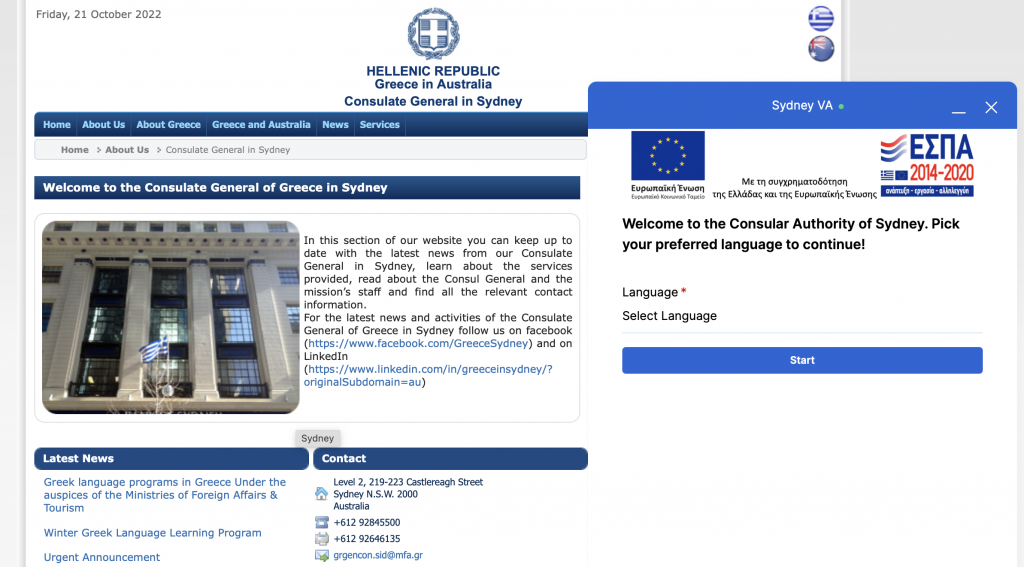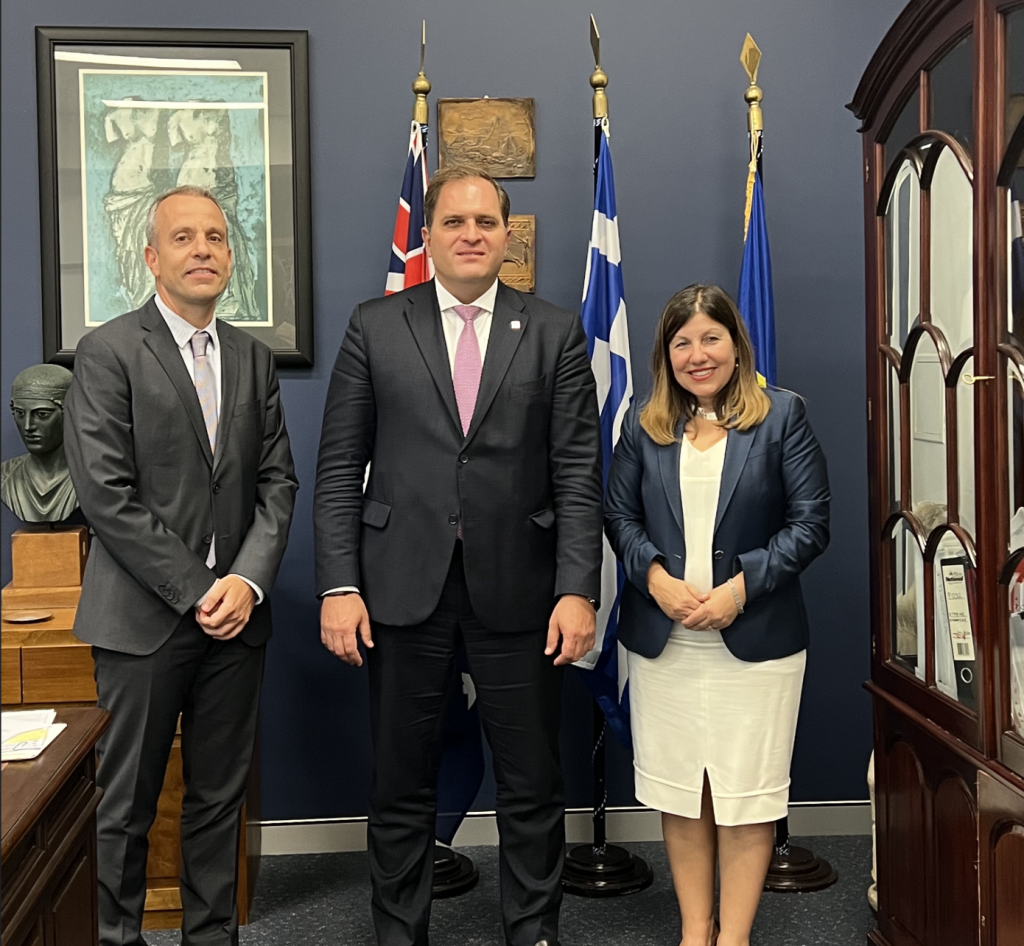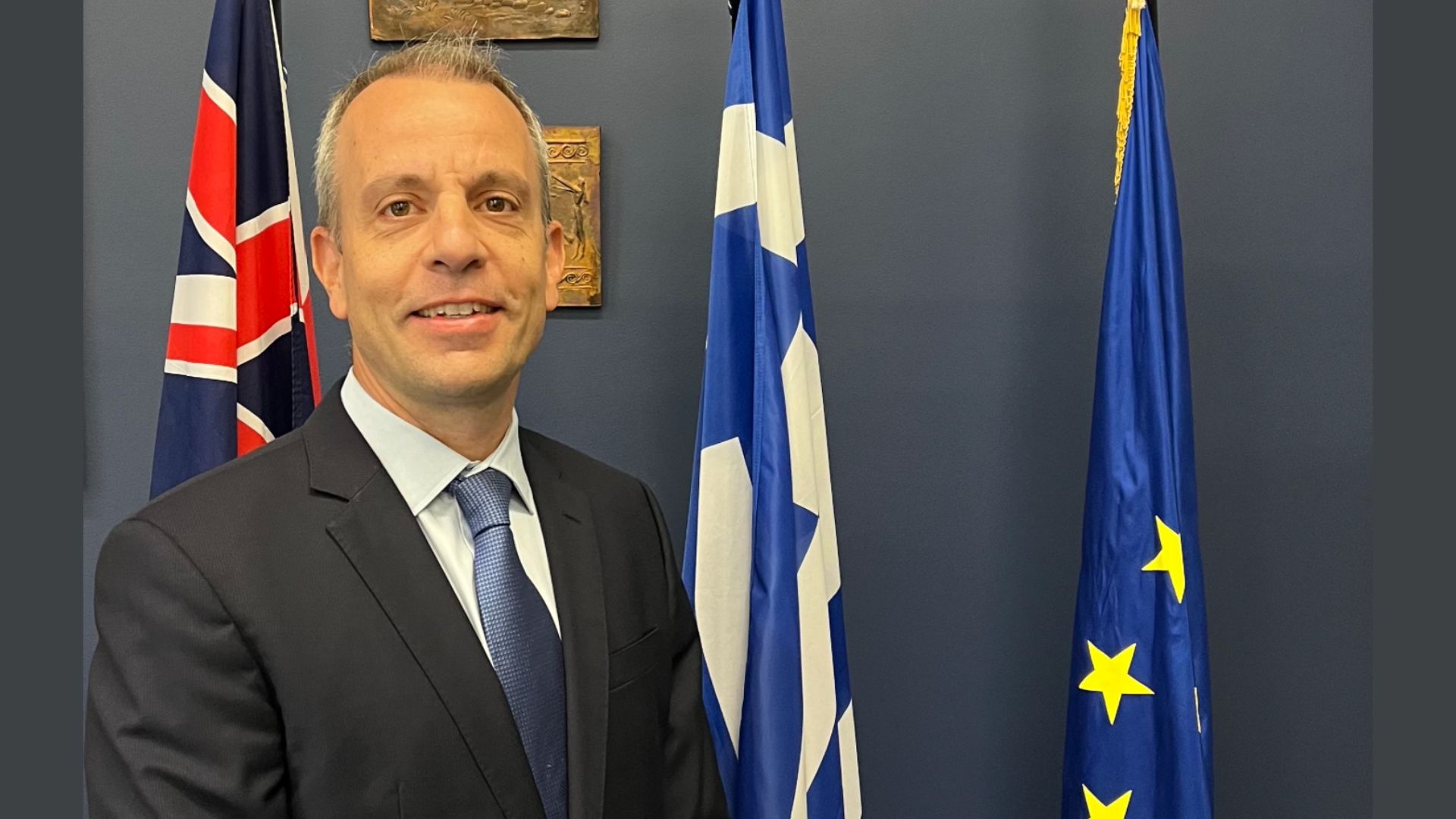When the conversation begins and ends discussing about the beauties of Greece, Seferis and the Greek language, you know it’s going to be a great chat.
“Perhaps the only negative is that I have not been able to bring with me the weather of Cyprus, where I served for the last four years,” says the recently appointed Consul General of Greece in Sydney, Ioannis Mallikourtis.
In his first interview after he was appointed to the role nearly a month ago, Mr Mallikourtis speaks about his career evolution, thoughts on how he plans to face challenges brought up by the pandemic and his favourite things about the homeland.
TGH: Mr Mallikourtis, welcome to the Antipodes. Australia is home to one of the most important and dynamic parts of the Greek Diaspora and the community in Sydney is particularly active. What is your first impression and how do you feel being here?
I am excited to be here and to be able to serve one of the most dynamic sections of the Greek diaspora. My first impressions are only positive. What has fascinated me is that Australian Greeks have successfully integrated into Australian society while preserving their heritage, culture and language. They are equally proud of their origins but also of their new homeland.
TGH: You served in Cyprus before coming to Sydney. What are your thoughts on the Cyprus Problem?
I arrived in Cyprus in September 2018, that is, the day after the Crans Montana conference, when no negotiations were in progress. Since then, Turkey and the Turkish Cypriot leadership have put forward the unacceptable position of the two-state solution, which is contrary to a series of Security Council resolutions and international law.
For its part, Greece is a pillar of stability in the Eastern Mediterranean, participates with Cyprus in trilateral cooperation schemes that contribute to the maintenance of peace and security in the region and supports the solution of the Cyprus problem on the basis of the parameters of the United Nations, the requirements of international law and the judicial principles and values of the EU, in which the two countries also participate.
In addition, as the Prime Minister of our country recently stated from the podium of the United Nations General Assembly, the international community should not ignore the illegal actions of Turkey to impose fait accompli on the ground and especially in Varosia, but also the new and repeated violations of the maritime zones and the airspace of the Republic of Cyprus.
TGH: What has been your favourite diplomatic post so far and why?
I have served in chronological order at the UN in New York, in Amman – Jordan, at the UN in Geneva and, as I mentioned above, in Nicosia, with intermediate stations of course at the Central Service in Athens. Each post has its beauty and peculiarities. I’d say all the posts gave me something.
Despite this, professionally, I believe that my tenure in New York, which coincided with Greece’s two-year tenure as a non-permanent member of the UN Security Council (2005-6), and my tenure as deputy head of the Embassy of Greece in Cyprus were probably the richest in experiences.
You know, to a Greek diplomat, Cyprus brings out a lot of emotions. As Seferis said when he visited in the 1950s, “from here one feels Greece (suddenly) spacious, wider”. Especially for me who has family ties to the island.
TGH: You resumed your duties in a period after an unprecedented pandemic where the demand for services has increased. What are the challenges you are facing and how do you plan to overcome them?
During the pandemic, two main phenomena arose that reduced the volume of work of the Consulate General. On the one hand, international travel was significantly restricted (so, what is the reason for a passport for Greeks and what is the reason for visas for citizens of third countries) and, on the other hand, the physical presence of citizens in public services was banned or even restricted for a long time.
So, attendance at the Consulate General was reduced. From the moment we are now moving to the post-COVID era, it happens, by contrast, exactly the opposite. The demand for services is growing. This increase is undoubtedly a challenge for the Consulate General, all the more so that the staff has not been increased.

So the challenge for us at the Consulate General is to be able to cope, using technology as well. For example, since the summer the system of the virtual assistant for the services of the Consulate has been in place. This tool, which is located on the main website of the Consulate, answers the basic questions of citizens on a number of consular issues.
For example, I want to see what documents are required to renew my passport or what the procedure is to issue a certificate of permanent resident abroad etc. I don’t need to call. I can find this information through the virtual assistant application.
TGH: The retention and maintenance of the Greek language is a pressing issue for the diaspora. What are your thoughts on this matter?
I think you are raising one or perhaps the most crucial issue facing the diaspora, both in Australia and elsewhere.
In the first place, as I have not even three weeks in the post of Consul-General at Sydney, I do not think I am then most qualified to give an opinion on this subject. I think it will take time to draw informed conclusions. However, in the form of preliminary considerations, I will note the following: on one hand, to demand and be disappointed because the third generation of Australian Greeks does not speak as well as their grandparents is unrealistic. The language weakens over time, all the more so that English is a steamroller. On the other hand, the objective conditions in Australia for the preservation of the language are favourable, which is not the case elsewhere on the planet, where there is Hellenism.
In Sydney, as you know better than I do, there are three Greek schools of the Holy Archdiocese of Australia, at the same time Greek is taught in the Greek Orthodox Community of NSW Afternoon Greek Schools, public schools and in tertiary education.
At the same time, a flourishing and dynamic homogeneity with economic surface is present. Thus, the objective conditions and resources for the preservation of language exist. And for now I will stop here because, as I said, it is still premature to draw conclusions on this matter.

TGH: Greece wants to attract more foreign investors and Australia is high on the list. What improvements can be made in your opinion to facilitate this? What are the latest developments in the double taxation agreement between Greece and Australia?
The issue of concluding a double taxation agreement was discussed with Australia during the recent visit of the governor of The Independent Public Revenue Authority, Mr. Pitsilis, to Australia. Discussions continue and we hope for a happy outcome.
The conclusion of this agreement, when completed, will be beneficial both for our expatriates and for those who wish to invest in our country. What needs to be understood in this regard is that in Greece there is an investment environment that favours foreign direct investment. The statistics speak for themselves.
In 2021, foreign direct investment reached 5 billion euros, compared to 2.8 billion euros. in 2020, recording a record largest inflow of FDI since 2002 . Similarly, for this year the figures are particularly encouraging.
TGH: When you think of Greece what are the five first things that come to your mind?
My loved ones, those I lost and those who are alive. The blue of the sea, the abundant light that always fills you with optimism. Its history as I come from a family that always discussed and reflected on Greek history and, finally, the sounds of a summer lunch on my mother’s island, Kefalonia, where I spent all the summers of my childhood.
TGH: What is your message to Sydney’s Greek diaspora?
I have already been in this position for almost three weeks, and many are commemorating some of my predecessors for their contribution. Each of them put a stone in it. The kind words I hear about them are, I think, the ultimate reward.
What I want to say to the Greeks of Sydney is that they will not hear big words and promises from me. Let’s set a few goals and achieve them together, for the benefit of the Hellenism of Australia.
READ MORE: ‘We are always by your side’: Greek Independent Authority for Public Revenue Governor

